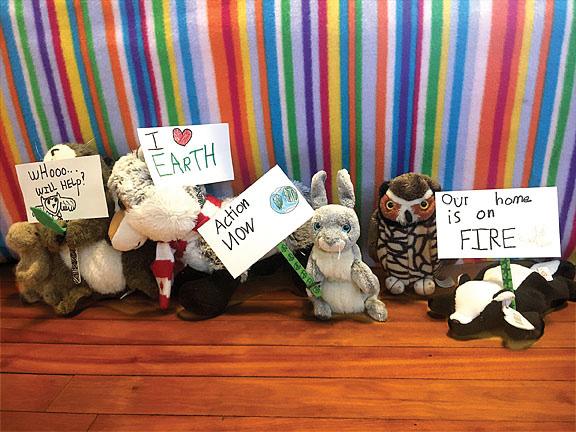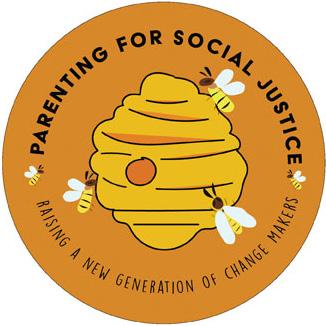
6 minute read
Action Now! by Jubilee Anthes, Katie Wilson, and Junio Anthes-Moody
collaboration with my kids, so they have a say in what happens in their life and so they feel affirmed in their humanity and decision-making power.
For example, last summer we took a media break as a family. We already have a one-hour-a-day limit, but the kids think about and plan for that hour all day long. I was exasperated by their focus on screen time. So we sat down and talked for about five minutes about how they were losing out on important time with friends and time outdoors because they were too focused on watching TV and playing electronic games. In our conversation we decided to take a media break for the summer, with a few exceptions. This was a respectful and mutual decision and affirmed all of our humanity and needs.
Advertisement
There are many ways that a parent can affirm children’s decision-making power. Can you think of an example of where you are able to affirm your children’s decision-
Action Now!
BY JuBILEE ANTHES, KATIE WILSON, AND JuNIO ANTHES-MOODy
this climate protest was inspired by the picture book this climate protest was inspired by the picture book Greta and the Giants by Zoë tucker and Zoe persico. During thisGreta and the Giants by Zoë tucker and Zoe persico. During this time of CoViD-19, family-friendly actions are further apart. At least we can time of CoViD-19, family-friendly actions are further apart. At least we can continue our journey at home until we can gather back together again. continue our journey at home until we can gather back together again.
making power? It is important to note here that all kinds of circumstances, many of them related to class, race, ability, and family makeup, affect what makes most sense for each family. For example, maybe you can’t let your kids decide what they want for breakfast when you’re budgeting your food really tightly. It is particularly hard to affirm kids’ decisionmaking power when you as a parent don’t have much power yourself. Sometimes when we are in disadvantaged positions we have to teach kids to be okay with not having a choice. It can be important to name that reality, so that we and our kids don’t internalize it as a problem with us personally, but that we understand the lack of choice as connected to unjust systems.
What we do at home matters. Conversations over breakfast, apologizing when we make mistakes, and making friends outside of our “neighborhood” all contribute to social justice. As adrienne maree brown writes in Emergent Strategy, 2 “What we practice at the small scale sets the patterns for the whole system. I have to use my life to leverage a shift in the system by how I am, as much as with the things I do.”
My parenting for social justice practice is based on this principle. If I’m so busy attending activist meetings and protests that I’m not able to give my kids the love and attention they need, which creates connection instead of separation, then I am not creating a strong fabric for their future. There are times to contribute to the larger community and societal change and there are times to be at home with my kids. I need to make room for both instead of putting one over the other.

In the past couple of years I’ve reexamined how I live my life. I had been running around stressed out and unable to recognize my own needs because I was so busy responding to the needs of others. I wasn’t operating from a place of power — the ability to take action — but from a place of guilt and sometimes the inability to say no. I was depleted and was responding to my kids, my husband, and my coworkers from that depleted place. Once I recognized the need to take care of myself, and actually began to do it, I began to show up for my family and my community with more patience, humor, and creativity. Addressing injustice and working for social justice is not always easy, and sometimes it is not rewarding in the short term. This is a long game. The issues we are trying to address have been around for many many generations. We may see some small successes in our lifetime, and we are also going to see many defeats. We need to take time for healing, singing, enjoying each other, dancing, being quiet, and envisioning the world we are striving for. Without time to take care of ourselves, it is hard to cultivate that vision for change.
I recently heard Ash-lee Woodard Henderson, the co-director of the Highlander Center in Tennessee, speak on envisioning the world we are striving for. She said, “We move towards whatever our vision is, so it is crucial to have a radical vision for social justice.”3 She told a story about asking a group of
high school kids what their vision was for change. They answered that they wanted to hold the police accountable for the way they were policing their neighborhood. She said, “That’s great! Is that your highest vision? Are there police in your vision?” They went back into a huddle and when they came back they said, “There are no police, there’s no need for police. Everyone will have the housing, food, meaningful work, and community that they need for a dignified life.” Now that’s a vision! By articulating that more radical vision, those youth can work on creating that world.
Sherri Mitchell talks about the importance of envisioning the world we want to create. She lives by what she calls the the 10-10-80 rule4: investing 10% of our energy in looking at and understanding what needs to be changed, 10% of our energy in holding back the tide of harm that is coming at us, and 80% of our energy envisioning and creating the world we want to live in. This rule keeps me on track, focused on envisioning the world I want to live in instead of continually getting pulled into a downward spiral of everything that is wrong. When I am able to live into that vision, I can bring that visionary energy and creative thinking into my parenting.
As I’ve been more intentional about making sure I have the right combination of quiet time (through hiking, meditation, yoga, and personal retreats) and people time (through inspiring conferences, organizing meetings, and talking with mentors), I’ve been increasingly able to cultivate a radical vision of justice, equity, and peace. Visioning is healing and it gives me the strength to show up for parenting and for the racial justice organizing work that I do.
Parenting for social justice is a journey. It is not about perfection or about being the “most woke” or the “best social justice activist” (notice the separation present in those phrases?). It is about telling our children the truth, supporting connection instead of separation, and encouraging their radical visions for a just world. It includes having conversations about hard topics, noticing power dynamics, and paying attention to the small things. I’m so glad my family has a community of people to do this with, and I hope you find your community of practice too.
Angela Berkfield is a social justice educator and activist. She lives in southern Vermont and is a parent of two young boys who are advantaged because of race, class, gender, and ability. Angela has taught in a variety of settings over the past two decades and is a cofounder of the Root Social Justice Center, ACT for Social Justice, and Equity Solutions.
1 Teresa Graham Brett, Parenting for Social Change (Tucson, Social Change Press, 2011). 2 adrienne maree brown, Emergent Strategy: Shaping Change, Changing Worlds (CA, AK Press, 2017). 3 Ash-Lee Henderson, Co-Director of Highlander Center, Speech at CommonBound, July 2018. 4 Sherri Mitchell, public talk at the Brooks Memorial Library, Brattleboro, VT, May 2018.










